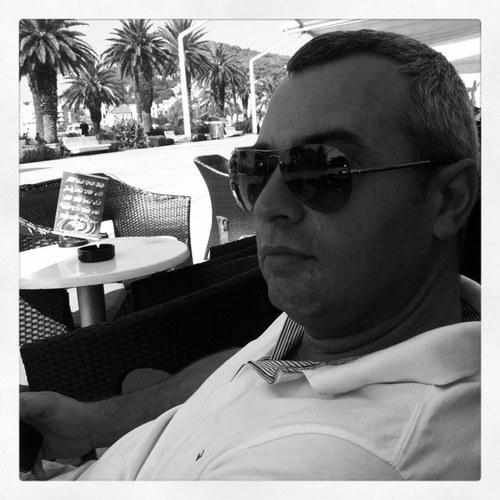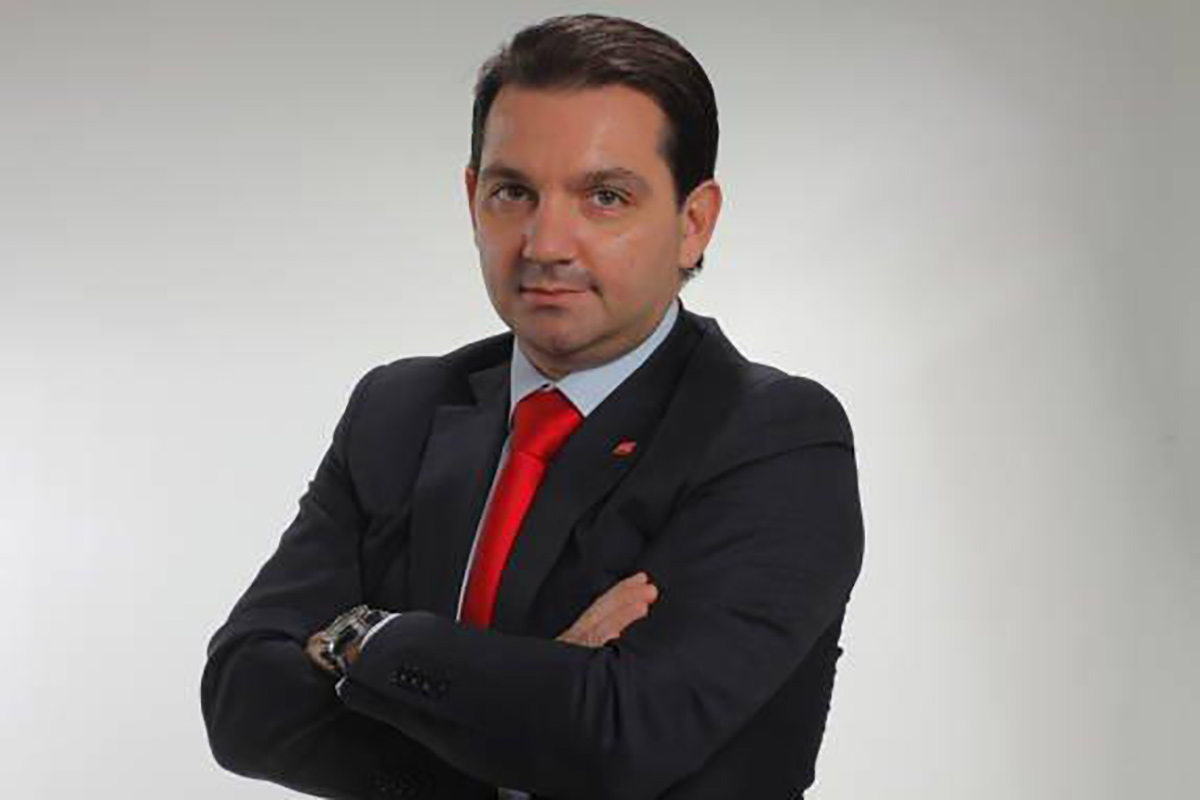In late June 2001, a Mitsubishi Pajero SUV belonging to V.B., a Belgrade resident who didn’t want his name used for fear of retribution, was stolen.
His pregnant wife was behind the wheel.
“They attacked a pregnant woman. … As she stepped out of the car, [the thief] pulled her down and she fell on the asphalt,” V.B. told KRIK, recalling the incident seventeen years later. “It was a classic carjacking.” (The police report filed at the time describes a somewhat tamer version of the crime.)
According to the report, V.B. had heard from a friend that a private investigator named Ranko Vukomanovic had successfully resolved a similar case, and reached out to him.
The two men made a deal to start a search for the car. The detective called him that same evening saying that he had found it, but explained that the thieves had demanded 7,000 German marks (about US$ 3,000) for its return.
This demand raised V.B.’s suspicions that the detective knew more than he was admitting. He decided to call the police.
Together, he explained to reporters, he and the police officers then developed a plan: He would visit the detective and pay for his services -- and for the car -- with banknotes the police had given him.
The officers drove V.B. to the detective agency. One of them came in with him undercover, posing as a friend, while others stayed in their car outside.
Inside, detective Vukomanovic made several calls to unknown parties who allegedly knew where the stolen vehicle was. He then told V.B. that they wouldn’t let him see it until he had paid. He refused.
According to the police report, while they spoke, two of Vukomanovic’s associates -- Dragan Colovic, also a police officer, and Nenad Latincic, another employee of the detective agency -- came into the office.
 Private investigator Ranko Vukomanovic, sometimes described in the Serbian media as "Belgrade's James Bond." (Photo: Twitter)Soon after, Vukomanovic and his colleagues began to suspect that the police were involved. The detective told V.B. that nothing could be done about his car, and that the thieves had withdrawn their offer. Colovic and Latincic rushed out of the office and tried to escape by car, V.B. said.
Private investigator Ranko Vukomanovic, sometimes described in the Serbian media as "Belgrade's James Bond." (Photo: Twitter)Soon after, Vukomanovic and his colleagues began to suspect that the police were involved. The detective told V.B. that nothing could be done about his car, and that the thieves had withdrawn their offer. Colovic and Latincic rushed out of the office and tried to escape by car, V.B. said.
The officers outside reacted immediately and arrested all three men. This is how this group of “stolen cars ‘finders,’” as it was called in the media, fell.
V.B. told KRIK that he never saw his car again. And he’s not the scheme’s only victim. The police and the prosecutor's office found that the same group was behind at least six other car thefts in 2000 and 2001, according to documents obtained by KRIK.
Seventeen years later, nobody has been convicted for any of these thefts. V.B. can’t get over his bitterness to this day, and says he has lost faith in his country’s government and justice system.
The Gang Goes Free
Further details about how the group allegedly operated are revealed in police and prosecution documents, which describe the specific role played by each member.
Typically, one group of men would steal the cars using a specially designed tool called a “breaker” and take them to a safe place. Colovic would look up the license plates to find the vehicle’s owner and forward the information to Vukomanovic. The detective would then call the owner and offer to find the car -- for a price.
After being paid, the group would reveal where the vehicle was parked. They would then split the money among themselves, according to the police documents.
All three of the arrested men testified that the plan had been developed by Vukomanovic and Colovic, the police officer. According to their testimony, Colovic had approached Vukomanovic, telling him that he had an associate who could steal cars throughout Belgrade, and the detective agreed to the plan.
Vukomanovic also implicated a recently deceased criminal named Mirko Besevic in the scheme. Besevic -- also known as Besa -- became so infamous during the nineties that director Srdjan Dragojevic based one of the characters in his cult film “The Wounds” on him. Nearly a hundred criminal charges and several arrest warrants had been filed against Besevic, but he was killed in 2001 after being shot in a clash with police.
The police reports on the case were inconsistent. The final versions showed that Colovic and Latincic had confessed to the crimes; but according to the reports that describe their initial interrogations, they had denied any involvement.
“Belgrade’s James Bond“
Vukomanovic, whose training was in working with children with disabilities, has said that his shift in the late 1990s to the “exciting” and “dynamic” world of detective work was the realization of a childhood dream.
In March 1999, he founded a detective agency called “Bond.”
The agency successfully solved numerous client requests, he told the media, which started calling him “Belgrade’s James Bond” and the “Serbian Poirot.”
Many clients hire him to verify the fidelity of their spouses or to do due diligence checks on companies. He also performs criminal background checks, says he can determine whether somebody is a member of a sect, and can help drug addicts, in his words, “return to the right path.”
Vukomanovic’s cooperation with the Ministry of Interior, prosecutors, and courts is an important factor in his successful work, he said in a 2006 interview, which was conducted while the trial against him was still ongoing.
In February 2002, prosecutors dropped all charges against Colovic and Latincic, and the proceedings continued only against Vukomanovic.
In the end, instead of indicting him for criminal offenses, prosecutors tried him for covering up the thefts. But after a four-year trial, the statute of limitations on the crimes expired in mid-2007 and the charges against him were dropped as well.
Vukomanovic told KRIK reporters that, despite the findings of the police investigation, he had never committed any crimes. He grew angry during the interview, threatening to investigate the journalist working on the story. “I’m going to call you in fifteen days, when I’m done with my investigation, to ask for your opinion about things you’ve done,” he said. “Private and business things!”
During his trial, Vukomanovic publicly boasted of his good ties with the police. To this day, he is often described in the media as a successful private detective with years of experience, and is frequently called on by journalists to comment on crimes.
Vukomanovic had also managed to establish a trusted relationship with a senior politician. According to the latest available data, “Belgrade's James Bond,” as the media calls him, is playing an important role in a company owned by Vladimir Marinkovic, a vice president of the Serbian parliament.
“I didn’t really know those details”
Marinkovic has been a member of Serbia’s National Assembly, which has just a single chamber, since 2012 -- first as an MP and later as a vice president. He was elected to his post as a member of the Social Democratic Party of Serbia, which is a member of the country’s ruling coalition.
 Vladimir Marinkovic, a member of the Social Democratic Party of Serbia and senior legislator in the country’s National Assembly. (Photo: Facebook)
Vladimir Marinkovic, a member of the Social Democratic Party of Serbia and senior legislator in the country’s National Assembly. (Photo: Facebook)
Even as he serves in Serbia’s highest legislative body, Marinkovic is the majority owner of a consulting company, VD Kolektiv 2010, which he founded eight years ago.
According to the country’s anti-corruption legislation, as a public official, Marinkovic was supposed to transfer his management rights of the company to someone else, which he did not do on time.
As a result, the Anti-Corruption Agency issued a warning urging him to adhere to the law. In September 2013, after a year in violation, he finally made the transfer -- to none other than detective Vukomanovic, as KRIK reporters discovered in the country’s business registry.
It’s a common practice in Serbia for politicians to transfer the management of their businesses to trusted people who can look after them until they complete their public careers. That’s why the fact that Marinkovic chose Vukomanovic to play this role suggests a trusting relationship between the two men.
Not much is known about Marinkovic's company apart from the fact that it’s registered as a consulting service. It’s not known who its clients are or what kind of services it offers.
In response to reporters’ questions, Vukomanovic described why he accepted the managing rights of the company and why his plans didn’t work out. “I had foreign partners who wanted to invest,” Vukomanovic explained. “It was an unstable situation in the country for investment, so they left.”
When KRIK reporters visited VD Kolektiv’s registered address in Belgrade’s Zemun municipality, they found no indication that its offices are really located there.
According to the Serbian land registry, the owner of the apartment at the address -- which Marinkovic also used on his CV -- is a woman named Natasa Stanisavljevic, who works in the Belgrade City Administration. Her name also appears in the business registry as the owner of one percent of VD Kolektiv. Marinkovic told reporters that he had previously lived there, but did not want to specify the nature of his relationship with Stanisavljevic, smiling and describing it as “friendly.”
According to Serbia’s central bank, VD Kolektiv’s bank account has been blocked for at least three years for unpaid debts. It is not known who the company owes money to.
In an interview with KRIK in his National Parliament office, Marinkovic confirmed that he had transferred his management rights to Vukomanovic, but said he hadn’t known about his associate’s alleged criminal background.
“I’ve known him for 10 years, but we’re not close. I really didn’t know those details of his biography,” he said.
Marinkovic described the transfer as convenient for both men, the outcome of a chance conversation. “He needed a company to do business with, and I needed somebody to transfer management rights to,” he said.
He says that he forgot what his company was engaged in. “[It] has done two or three consulting projects, but I honestly can’t remember [the details]. The company is now frozen. It hasn’t operated for years,” he said.
Vukomanovic, too, told reporters that the two men weren’t especially close. “I know [Marinkovic] from around town,” he said. “I don’t remember when I met him, long ago. We saw each other from time to time.”
The Detective Law
Years after all charges against Vukomanovic had been dropped, the Serbian parliament considered a law that, if differently formulated, could have prevented a man with his background from continuing to work as a private detective. And as it turns out -- though he denies it -- he may have been in a position to influence how the law was written.
The National Assembly passed the “Law on Detective Activity” -- Serbia’s first legislation regulating this field -- in November 2013.
While the law was being drafted and voted on, Vukomanovic was vice president of the Detective Association at the Serbian Chamber of Commerce, which the Ministry of Internal Affairs consulted on the legislative project.
The proposed law was criticized by the opposition and by non-governmental organizations. A key objection was that it didn’t prohibit people who had ever been investigated for crimes, those facing charges, or convicted criminals from establishing detective agencies.
An amendment proposed by the opposition to address the issue was not adopted.
Predrag Petrovic, the Executive Director of the Belgrade Center for Security Policy (BCBP), told KRIK that the first draft of the law envisioned a security check of detective agency owners, but that provision disappeared when the draft law was submitted to the Assembly.
Petrovic pointed out that, had the security check been adopted, a person like Vukomanovic would be disqualified from working as a detective. Since detectives have access to sensitive information and personal data, he said, it is important to restrict the profession to anyone who has faced criminal investigation.
“[Detectives] have the ability to perform, for example, the task of searching for missing persons and things, which means that this could be a cover for ransoming stolen cars,” Petrovic warned. “Such a scenario is possible.”
Both Marinkovic and Vukomanovic said that neither of them had participated in the drafting or adoption of the legislation.
“I wish I was so influential and powerful that I could change things like that,” Marinkovic said with a smile.
Meanwhile, V.B., the carjacking victim, showed little surprise after learning from reporters that the detective who allegedly tried to scam him had connections with a high-ranking politician. He had already suspected that the trials of the gang members who stole his car had been fixed.
“I am angry with the state,” he told reporters. For him, the worst part was that they had attacked his pregnant wife -- and never faced the consequences. “Whom should I trust? I cannot trust either the state or the judiciary.”






